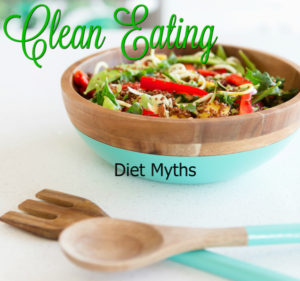
So it’s time to get healthy. You’re committed. You’ve set your intention. You’ve even picked an accountability partner and a start date. Then you go on the internet to do some simple searches for diet tips and you’re immediately overwhelmed with five thousand articles each claiming they’ve found the one true diet that will make you look like a supermodel in 14 short days. The next diet claims that eating only fat will make you skinny. The next article shouts that all fat in your diet is bad and should be eliminated all together. It’s loud, confusing, and obnoxious. So today we’re going to cut through all the noise and discuss the top five myths about diets and find out the real truth.
Myth # 1: The Best Way to Lose Weight is to Go On a Diet
Wow. Bet you didn’t see this one coming right out of the gate.
The idea of a “diet” is to “start a program” that is specifically designed to help you lose weight. The problem lies in the mindset. If you look at a diet as temporarily doing something different in order to achieve weight loss, the odds are you’re going to stop doing it. My best advice? Don’t go on a “diet.” Instead, decide you’re permanently going to change the way you eat. Find a plan that works for you in the long term, and then make sure you’re eating the right amounts to encourage weight loss.
Myth # 2: Eating Smaller Portions More Frequently Actually Boosts Your Metabolism and Promotes Weight Loss
This theory has been floating around the internet for a very long time. The idea is that if you keep adding small amounts of food, your metabolism is always in high gear leading to more calories burned overall.
The truth is much different. The amount of food intake has little to no effect on metabolism. The one thing that does affect your metabolism is bigger muscles. Yep. You heard that right. One pound of fat free muscle burns about 14 calories a day as compared to a pound of fat that only burns about 3 calories a day. That doesn’t sound like a lot, but 14 calories a day adds up over time and can certainly lead to getting off those pounds, so try lifting some weights or any kind of strength training.
Myth # 3: Don’t Eat Anything After 7 at Night
There are three things you must remember: don’t expose them to bright lights, don’t get them wet, and whatever you do, don’t ever feed them after midnight. Gremlins is one of my favorite movies from my childhood and this myth completely reminds me of the warning given by the sage old man.
Your body burns calories morning, noon, and night. Your cells don’t have a wristwatch they look at to decide when to burn calories. The truth is most people who eat at night are tired and mentally fatigued from the day and the snacks they grab tend to be unhealthy. So it’s really not about the time of day, but the snack itself. If a tub of ice cream accompanies your Game of Thrones binge watching, maybe try a piece of fruit instead.
Myth # 4: Cut Your Calories Down A Lot!!
Ok. This one gets a little tricky. If you cut your caloric intake down to say 1200 calories a day, yes you will lose weight. The problem is that it won’t last for long. Our bodies are amazing machines that are able to detect when we go into “starvation mode.” On an extremely low calorie diet, the body gets very good at being efficient with the calories it’s been given to ensure your survival. Also, because you feel deprived and hungry, the odds of long term success are much smaller.
The best way to lose weight and keep it off is to try a modest calorie restriction that you are comfortable with and then never stop. Like Myth #1, this will set you up for the greatest level of success.
Myth # 5: Diet Foods are Helpful With My Diet
Not exactly. Low-fat, Low-carb, diet foods are everywhere in the grocery store. They promise to make the process of being on this diet painless and easy. The catch? Just because they are low-carb or low-fat doesn’t necessarily mean they are low-calorie. Just because something says diet on the label doesn’t mean in fact it is good for you. Also, there’s a tendency to eat more of the diet food because it’s healthier. The increase in serving size negates the healthy aspects of the food in the first place.
Look at the nutrition label and continue to control your portion sizes to promote weight loss and good health. And don’t believe everything you see on the food labels.